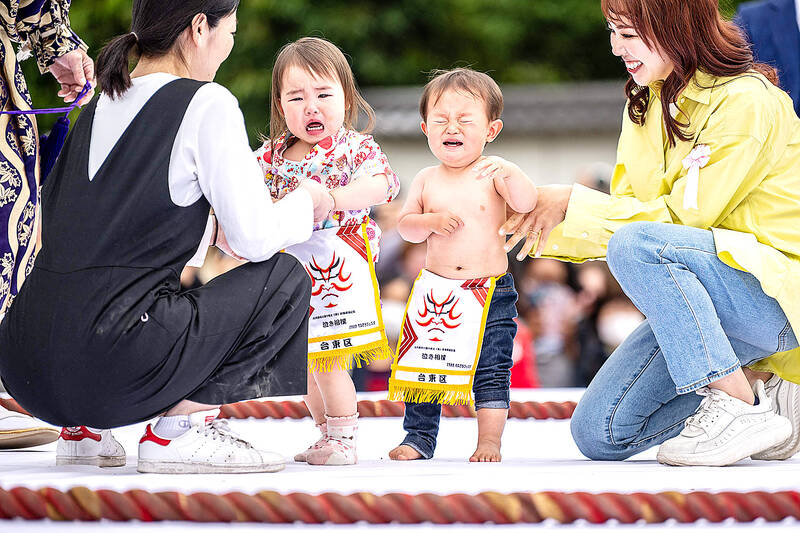Dozens of bawling Japanese babies yesterday faced off in a traditional “crying sumo” ritual believed to bring the infants good health, which returned for the first time in four years after the COVID-19 pandemic.
Pairs of toddlers wearing ceremonial sumo aprons were held up by their parents and faced each other in the sumo ring at Senso-ji in Tokyo.
Staff wearing oni monster masks tried to make the babies cry, with the first to bawl declared the winner by a sumo referee in an elaborate traditional uniform holding a wooden fan used to signal victory.

Photo: AFP
“We can tell a baby’s health condition by listening to the way they cry. Today she may get nervous and not cry so much, but I want to hear her healthy crying,” said Hisae Watanabe, mother of an eight-month-old baby.
“Crying sumo” events are held at shrines and temples nationwide, to the delight of parents and onlookers.
Shigemi Fuji, chairman of Asakusa Tourism Federation which organized the event, said that some people might think it is terrible they make babies cry.

Photo: AFP
“But in Japan, we believe babies who cry powerfully also grow up healthily. This kind of event takes place in many places in Japan,” he said.
Sixty-four babies participated in the ritual, the organizer said.
The rules vary from region to region — in some places parents want their offspring to be the first to cry, in others the first to weep is the loser.

When Shanghai-based designer Guo Qingshan posted a vacation photo on Valentine’s Day and captioned it “Puppy Mountain,” it became a sensation in China and even created a tourist destination. Guo had gone on a hike while visiting his hometown of Yichang in central China’s Hubei Province late last month. When reviewing the photographs, he saw something he had not noticed before: A mountain shaped like a dog’s head rested on the ground next to the Yangtze River, its snout perched at the water’s edge. “It was so magical and cute. I was so excited and happy when I discovered it,” Guo said.

TURNAROUND: The Liberal Party had trailed the Conservatives by a wide margin, but that was before Trump threatened to make Canada the US’ 51st state Canada’s ruling Liberals, who a few weeks ago looked certain to lose an election this year, are mounting a major comeback amid the threat of US tariffs and are tied with their rival Conservatives, according to three new polls. An Ipsos survey released late on Tuesday showed that the left-leaning Liberals have 38 percent public support and the official opposition center-right Conservatives have 36 percent. The Liberals have overturned a 26-point deficit in six weeks, and run advertisements comparing the Conservative leader to Trump. The Conservative strategy had long been to attack unpopular Canadian Prime Minister Justin Trudeau, but last month he

Chinese authorities said they began live-fire exercises in the Gulf of Tonkin on Monday, only days after Vietnam announced a new line marking what it considers its territory in the body of water between the nations. The Chinese Maritime Safety Administration said the exercises would be focused on the Beibu Gulf area, closer to the Chinese side of the Gulf of Tonkin, and would run until tomorrow evening. It gave no further details, but the drills follow an announcement last week by Vietnam establishing a baseline used to calculate the width of its territorial waters in the Gulf of Tonkin. State-run Vietnam News

PROBE: Last week, Romanian prosecutors launched a criminal investigation against presidential candidate Calin Georgescu accusing him of supporting fascist groups Tens of thousands of protesters gathered in Romania’s capital on Saturday in the latest anti-government demonstration by far-right groups after a top court canceled a presidential election in the EU country last year. Protesters converged in front of the government building in Bucharest, waving Romania’s tricolor flags and chanting slogans such as “down with the government” and “thieves.” Many expressed support for Calin Georgescu, who emerged as the frontrunner in December’s canceled election, and demanded they be resumed from the second round. George Simion, the leader of the far-right Alliance for the Unity of Romanians (AUR), which organized the protest,